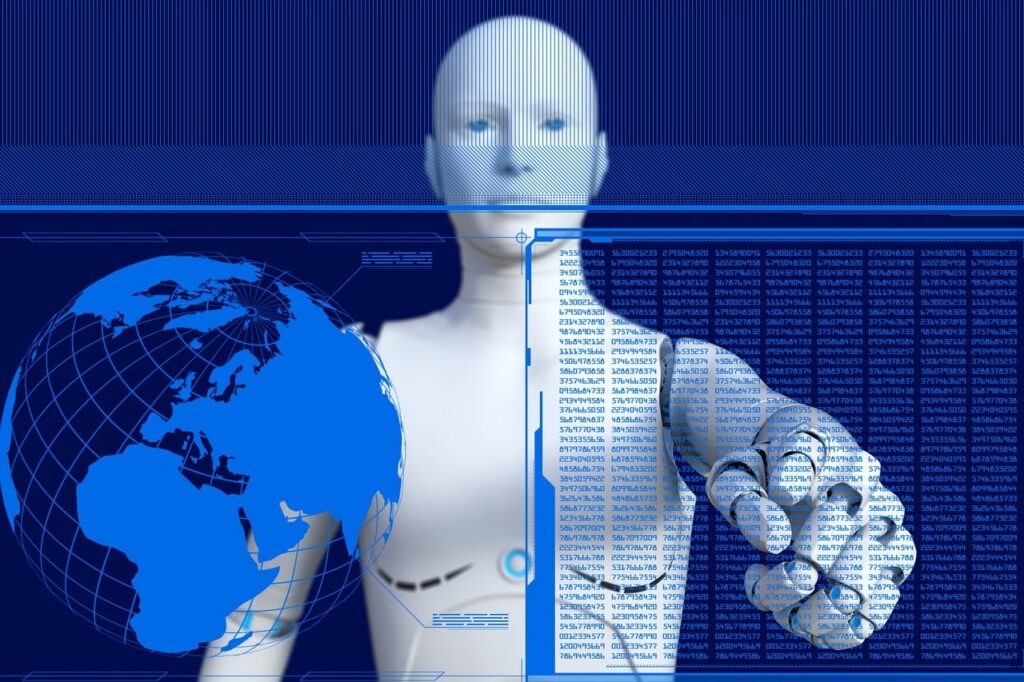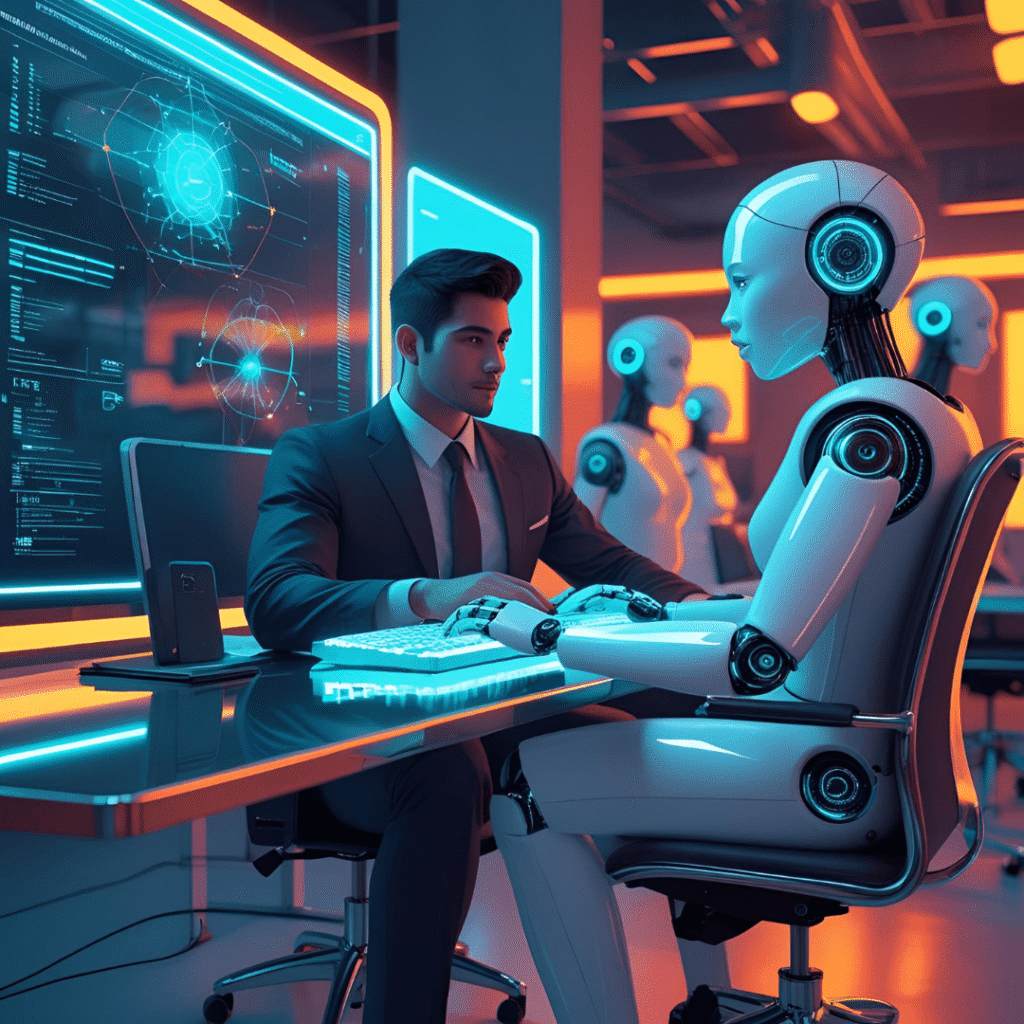Frequent Artificial Intelligence (AI) automation and advancement are transforming the world. Currently, people are using artificial intelligence in every sector, from the company’s automation to normal people. Every industry nowadays is integrated with AI for better research, service, and production. Normal people in day-to-day life also use AI to increase their productivity. As AI is changing and evolving day by day, people’s productivity and efficiency have increased. AI is helping people to automate their repetitive and time-consuming tasks. AI also analyzes large volumes of data, analyzes patterns, and helps people make real-time decisions quickly and fast. Due to the new technologies, products, and services, people are becoming innovative, and they are acquiring problem-solving abilities due to AI. Every sector in the world is developing and evolving due to AI, whether it’s small companies or big tech giants.
Not only that but due to it, people are getting enhanced customer experiences from the companies. The AI chatbots or virtual assistants help to answer people’s queries on personal preferences according to the customer’s behaviors. It is also enhancing the accessibility of the people with disabilities. The automation of the translation tools helps to crack the language barrier. It helps in the economic growth and job creation. Traditional jobs may be affected by AI, but creative jobs are increasing day by day. It has helped people to work in new business models, startups, and industries. Let’s discuss in detail how AI and automation are impacting jobs and how people can adapt to them to overcome this impact.
The Rise of AI and Automation
The rise of AI and automation has impacted people’s day-to-day lives. In the past years, AI has taken responsibility for everything with its advancement. With the rapid growth in computing power, data analysis, and machine learning algorithms, companies have started to integrate them into their products and services. One of the fastest-growing sectors of automation and AI is Robotic Process Automation (RPA), which means the advanced software and machines handle all the repetitive tasks and rule-based tasks, making human errors minimal. The bots and robots handle all the tasks with high accuracy and efficiency, which decreases costs and increases production.
Another place where AI has revolved around is machine learning, which helps in the proper data analysis and utilization. Machine learning programs are done by trained people, and they also analyze normal people’s input and behavior, process it, and give the output according to it. Not only has natural language processing (NLP) also improved human-computer interactions, but also… Nowadays there are lots of products sold by big tech giants like Alexa, Siri, Google Assistant, and many more that rely on NLP to understand the customer’s or the user’s queries and answer them according to the queries with the mixture of their satisfaction. It helps people to save their time on the internet and utilize it somewhere for their efficiency.

After the huge revolution of AI all over the world, companies have started to integrate AI into their systems, whether it is Uber, Tesla, or any other company. It has also helped the people in the field of the health care sector, where the drugs are made and analyzed with the help of humans and developed accordingly. It has also developed in the teaching and learning sector, where people used to learn from the traditional ways. Nowadays, due to AI, people have a virtual assistant who is there to teach and guide them according to their choice, resulting in the high learning ability of the students.
Job Displacement vs. Job Creation
Artificial intelligence has treated people with the conversation that due to AI and automation, jobs are at high risk, and the working style has changed from the traditional way to the advancements. Yes, AI will indeed take the jobs of the people who used to work in the traditional way, which was performed by humans only. But it’s not only that; the advancements and automation have also increased new job opportunities for the people. Many low-skilled jobs are being automated, like those of drivers and factory workers who used to perform the work manually, resulting in time consumption.
Manufacturing and assembling line work is being automated, and customer service representatives, retail jobs, transport and delivery, data entry clerks, telemarketers, agriculture jobs, construction jobs, and many other jobs are at high risk of automation; however, in these sectors also, if people adapt themselves to the technology, then it’s hard to get replaced.
With the job displacement, there is also the job creation in every field. Automation is creating new opportunities for people that did not exist before or rarely existed. The jobs are created, like machine learning specialists, data science and analytics roles, robotics and automation specialists, AI programmers and developers, AI-driven customer service roles, and many others. AI and automation are not eliminating jobs; they’re just teaching workers to adapt to the new technologies and utilize them, according to them. The future of the job opportunities will demand the perfect blend of expertise, creativity, and human-centric skills with high intelligence and thinking ability. People need to adapt and learn according to it and develop themselves in the future.
The Skills Gap and Workforce Adaptation
As technology has developed with time, people also need to develop and learn according to the advancements. Due to the technology, the workforce is also evolving with time. To remain in the market and beat the competition, competitor workers will also need to evolve according to it, developing the skills required. The concept of the skill gap has been a wide concern for the workers. There is a huge gap between the skills people have and the skills required in the market.
To address this and cope with the skill gap, the worker will need to develop lifelong learning skills and upskill with the times rather than stopping their education after the high school or college degree. There are several areas where workers need to keep an eye on and develop themselves with the skills according to it, like
Technical skills
The market and demand for technical skills are increasing day by day as automation and AI are taking over. r To handle automation and AI, workers will need to adapt themselves to technical education where they can work in the fields of artificial intelligence and machine learning, big analysis and big data, coding and software development, cyber security and networking skills, and many other skills.
Soft Skills
Another sector where people can adapt the learning is soft skills, which help the machine to give a human touch so that it does not feel like everything is machine-organized and boring. Soft skills not only teach the machine how to give a human touch, but also they give the machine the ability to think for problem-solving, critical thinking, emotional intelligence, adaptability and resilience, effective communication, and many more.
Lifelong learning skills
The best skill you can have to cope with the advancement and automation is to have the spirit of lifelong learning skills. Lifelong learning skills are the only thing that can save you from getting replaced. You can do online course certifications in your relevant field; you can do job training and mentorships, develop collaborating skills, and network, which will help you to survive in the market. By adapting these skills, the worker and the companies are both developed and are eligible in the new market.
